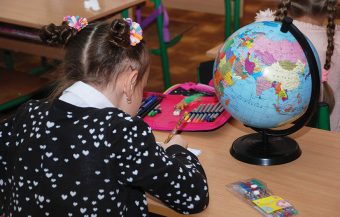
A child’s upbringing is a period during which they discover themselves and the world around them. Through tailored play, learning, and other activities, a child gradually develops the ability to think critically, behave responsibly, and take a stance with knowledge and arguments. Fundamental values and life understanding should also include an ecological aspect. Although the issue of c is very complex, introducing this topic step by step will instill in children a sense of responsibility for stopping climate change and preserving nature in general.
We spoke with Dr. Igor Leščešen, a scientific associate at the Faculty of Natural Sciences and Mathematics in Novi Sad and a geography teacher in elementary school, about how much attention is devoted to the topic of climate change in elementary schools and whether children at that age are ready to absorb such environmental knowledge. He was part of an expert team that researched how climate change is taught in elementary schools in Serbia.
The research was conducted as part of two projects, “ClearClimate” EU Horizon Europe and “CoolClimate” Erasmus+ project. The questionnaires, designed by Dr. Leščešen, Dr. Biljana Basarin, a full professor at the Department of Geography, Tourism, and Hotel Management at the University of Novi Sad, and Dr. Miroslav Vujičić, an associate professor at the same department, were distributed online. The questions in the questionnaire tested students’ knowledge about the causes and consequences of climate change, and the research results showed that the curriculum needs to be improved to provide children with a deeper understanding of this issue.
As our interlocutor explains, the idea for the research was born out of his ten years of experience as a geography teacher in elementary school.
IN FOCUS:
- Charging Infrastructure as the Foundation of E-Mobility
- Ecological Vision – Good Health of People and Nature
- Green Projects – TENT A Gets A Solar Power Plant
The Complexity of the Climate Change Topic
The topic of climate change is complex and challenging for children to understand. The professor says that it is important for children to be introduced to ecological topics from an early age, but the approach needs to be carefully selected according to their age.

“Environmental topics such as nature conservation, proper waste disposal, waste separation, and water conservation can and should be covered as early as kindergarten. However, the topic of climate change is extremely complex, and I believe that children in the fifth grade are not yet mature enough to grasp all aspects of this problem.”
As a solution, the professor suggests that related content should gradually be introduced in textbooks for each grade. For example, in the sixth grade, the focus could be on climate refugees; in the seventh grade, on the impact of glacier disappearance in the Himalayas on the lives of people in the valleys of major Asian rivers. In the eighth grade, the topic of climate change and its effects on Serbia could be covered, as by then children have enough background knowledge in biology, physics, and chemistry to understand the complexity of the topic. Additionally, children learn much better by the principle of “proceed from the known to the unknown,” which is why issues they can experience in their environment can be closer and more understandable than problems faced by people on the other side of the world.
Dr. Leščešen’s experience with students has shown that they are somewhat aware of the importance of environmental protection and possess a certain level of environmental consciousness. Most students are generally interested in environmental preservation, especially when faced with specific ecological problems, and the topic of climate change becomes particularly engaging for them when connected with concrete examples.
Prepared by Katarina Vuinac
The story was published in the Energy portal Magazine ECOLOGICAL TRANSPORT

